Microplastics are everywhere, and they’re harming our health! Drinking water is one of the main ways people consume microplastics. But the Environmental Protection Agency (EPA) hasn’t taken steps to stop microplastics in drinking water. The Food and Water Watch organization has successfully gotten seven governors to sign on to get the EPA to put the monitoring of microplastics in water on its list of priorities. By law, when seven state governors petition the EPA to monitor dangerous chemicals like microplastics in our water, the EPA must comply or provide a detailed justification for their refusal. For more information, click here.
Find out more from Beyond Plastics
Click here for the Plastics & Human Health Fact Sheet
Click here for more Beyond Plastics Fact Sheets
Click here for the Real Truth About the U.S. Plastics Recycling Rate
The U.N. is Negotiating a Treaty
that Could Solve the Plastic Problem
Watch the video below to find out What You Need To Know
The US plastics industry’s contribution to climate change is on track to exceed that of coal-fired power in this country by 2030, finds The New Coal: Plastics & Climate Change, a report from CAPA Senior Fellow Judith Enck and the Beyond Plastics project.
In 2021, the Environmental Issues Committee learned about plastics’ health and environmental impact, strategies for dealing with plastic disposal, and environmentally safe alternatives to plastic. We have developed a plastic brochure you can access below to learn more about the topic. The brochure is designed to show the magnitude of today’s problem and to encourage everyone to become involved in finding solutions.
The Beaver County cracker plant takes ethane, a component of Marcellus Shale natural gas obtained from fracking, and “cracks” it into ethylene. The ethylene is then used to make plastic “nurdles”, small plastic pellets, which are made into other plastic products when other chemicals are added. The cracker plant has had multiple violations in its short history. Learn more here.
As programs shutter and plastic use rose during the pandemic and beyond, a New York bill to get manufacturers to pick up the recycling tab could offer a solution. Click here to learn more.
Trex, a composite decking company, sponsors a plastic collection challenge. For every 250 pounds of plastic film collected, the group receives an entry in a quarterly drawing to win a TREX product in appreciation for the community’s recycling efforts. Note that this is a change from the previous program where a bench was awarded for collecting 1000 pounds of plastic.
The types of plastic you can recycle in the bins include: bubble wrap, grocery bags, bread bags, case overwrap, dry cleaning bags, ice bags, Ziploc/resealable bags, and cereal bags. See the Plastic Collection Poster and plastic lists for more information.
We have bins in the S&T Arena and outside the entrance of the YMCA. Please support this project by bringing your plastic to one of our bins. No bottles or hard plastic please. Thanks to all who support this recycling project. Any questions can be directed to: evergreenconservancy@gmail.com
In addition, LWVIC has partnered with No Plastic Please Pittsburgh, an organization that empowers individuals and communities to eliminate unnecessary single-use plastic including plastic cutlery, take-out containers, bottles, cups bags, stirrers, straws and all Styrofoam.
Read from Penn State Extension: Microplastics in Our Waters, An Unquestionable Concern
There was also a lot of interest in learning more about microplastics, so here’s some reading Dr. Mason recommended:
While plastic is important for a number of products, like medical devices, plastic producers have increasingly flooded our markets with unnecessary, wasteful products that cannot be recycled — largely because creating new plastics is cheaper than using recycled products.
The Break Free from Plastic Pollution Act would address this, and other key parts of plastic pollution, by:
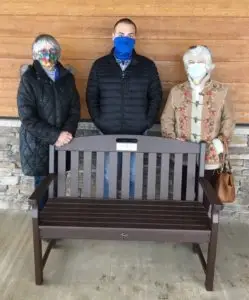
Bench at the new Indiana County Conservation District Office donated by LWVIC in conjunction with the Trex – Bags to Benches Project
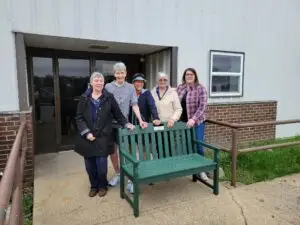
Third bench donated by LWVIC in conjunction with the Trex – Bags to Benches Project to the Indiana County Community Action Program.
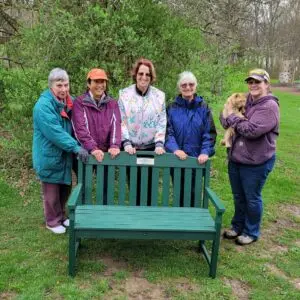
Fifth bench donated to Blue Spruce Park
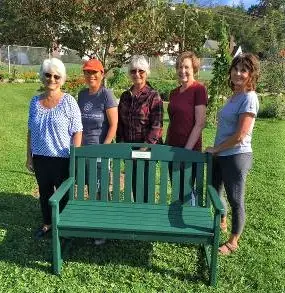
Second bench donated by LWVIC in conjunction with the Trex – Bags to Benches Project to the Indiana County Community Garden.

Fourth bench donated by LWVIC to the S&T Bank Arena
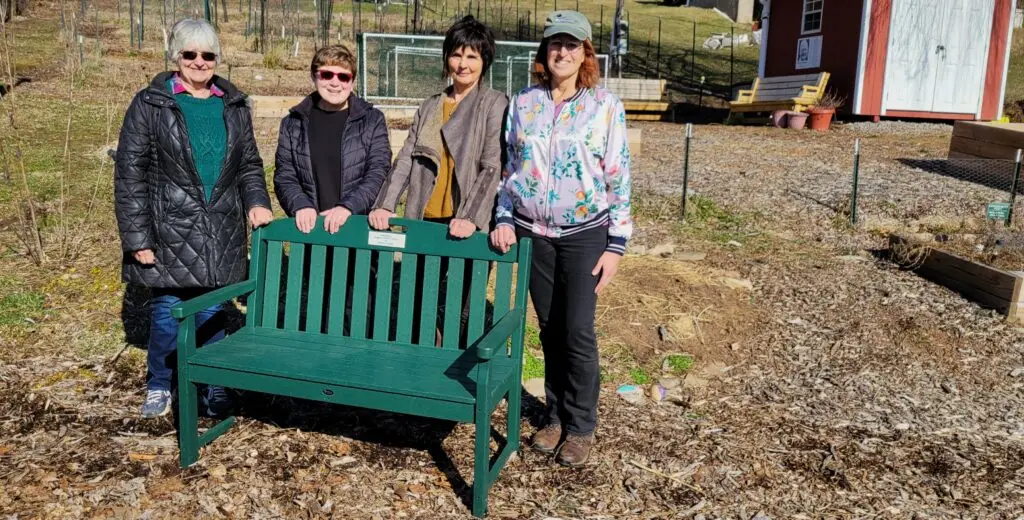
Sixth bench donated to the Chevy Chase Community Garden